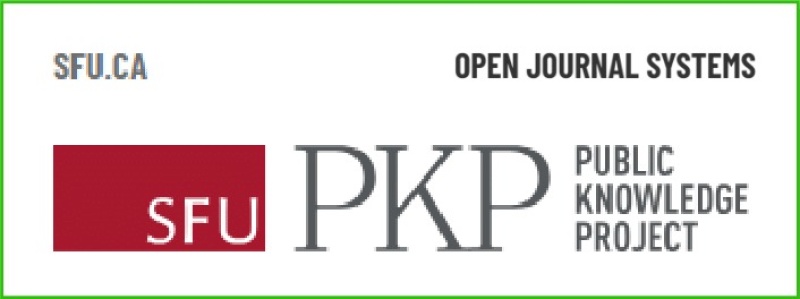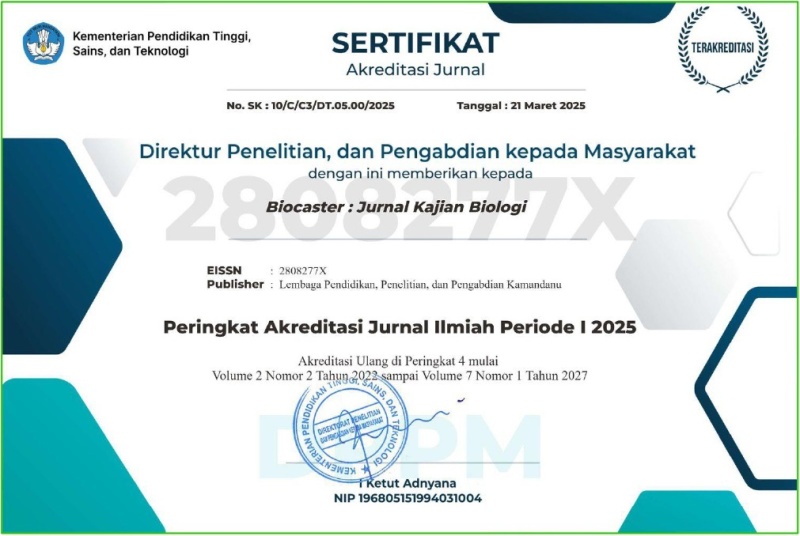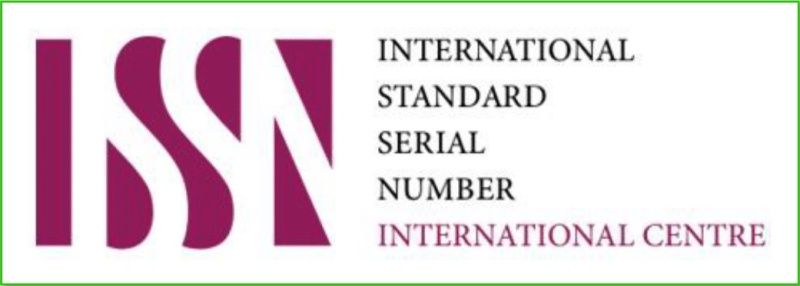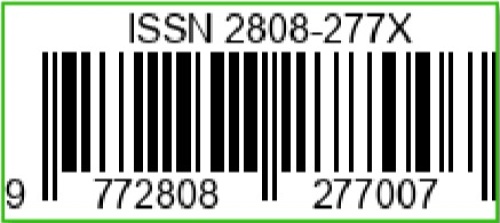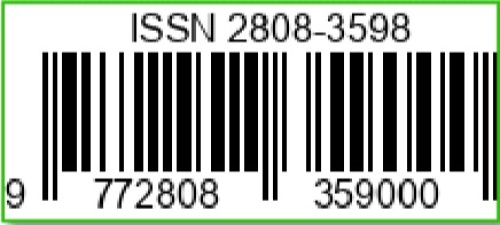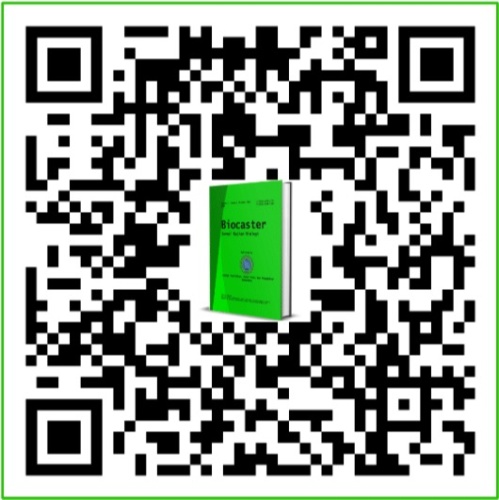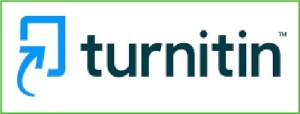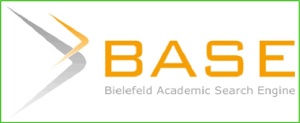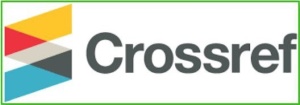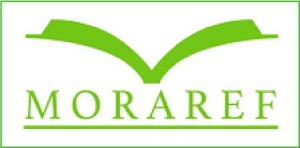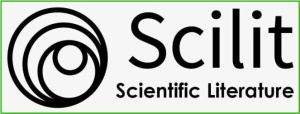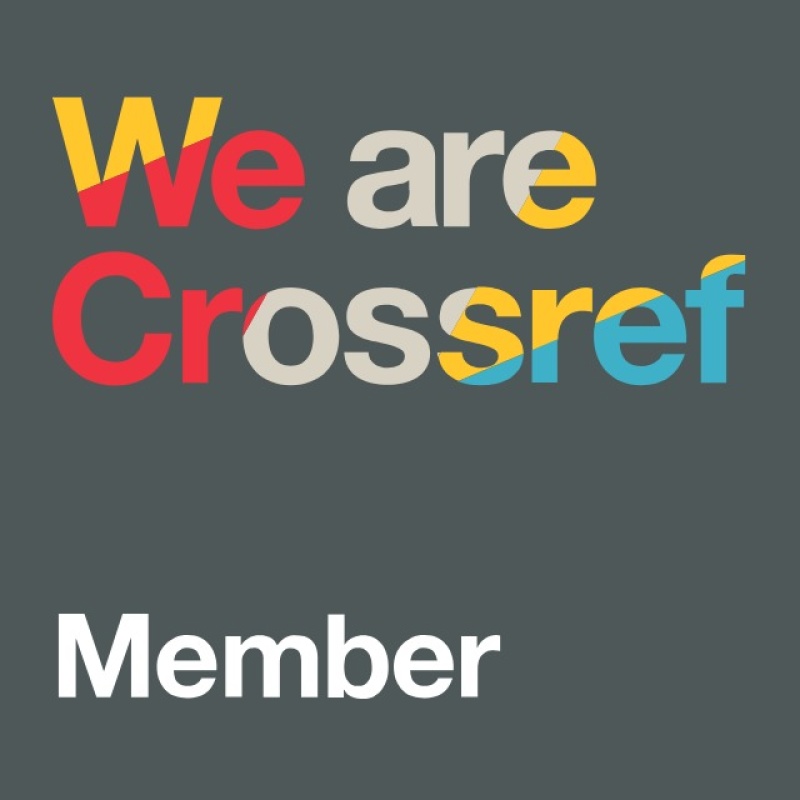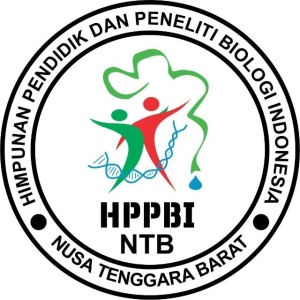Penerapan Model Pembelajaran Problem Based Learning untuk Meningkatkan Keterampilan Berpikir Kritis Peserta Didik pada Materi Sistem Pencernaan Manusia di Kelas XI SMA Negeri 1 Moutong
DOI:
https://doi.org/10.36312/biocaster.v5i4.771Keywords:
Critical Thinking Skills, Problem-Based Learning, Human Digestive SystemAbstract
This study aims to determine the effectiveness of the application of the Problem Based Learning model to improve students' critical thinking skills on the human digestive system material of class XI of SMA Negeri 1 Moutong. The study used a pre-experimental design method with a one group pretest-posttest design approach involving 25 students of class XI IPA2. The research instruments included critical thinking tests (pretest and posttest), learning implementation sheets, student activity sheets, and student response questionnaires. The results showed that the learning implementation reached an average of 94% with the category (very good), student activity 94% (very good), and student response 91% (very positive). The average pretest score of 42.2 increased to 79.2 in the posttest with an N-Gain value of 0.59 (moderate category). Significant improvements occurred in the indicators of providing simple explanations and organizing strategies or actions, increasing from 34.4% and 32% to 92%, respectively. These results indicate that the implementation of the PBL model is effective in improving students' critical thinking skills in the human digestive system.
Downloads
References
Akhmadi, A. S., Sugiarti, Y., & Rahayu, D. L. (2025). Pengembangan Media Pembelajaran Gamifikasi untuk Meningkatkan Motivasi dan Hasil Belajar Siswa pada Pembelajaran Elemen Olahan Hasil Hewani. Jurnal Ilmiah Pendidikan Teknik dan Kejuruan, 18(2), 225-238. https://doi.org/10.20961/jiptek.v18i2.92714
Andiasari, L. (2015). Penggunaan Model Inquiry dengan Metode Eksperimen dalam Pembelajaran IPA di SMPN 10 Probolinggo. Jurnal Kebijakan dan Pengembangan Pendidikan, 3(1), 15-20. https://doi.org/10.22219/jkpp.v3i1.2186
Aziz, S. A., Supriadi, S., & Herman, T. (2020). Keterampilan Berpikir Kritis Matematis (Konsep, Indikator, dan Asesmen Berupa Soal Tes dan Jawaban). Padang: UNP Press.
Boso, C. M., Merwe, A. S. v. d., & Gross, J. (2021). Students’ and Educators’ Experiences with Instructional Activities Towards Critical Thinking Skills Acquisition in a Nursing School. International Journal of Africa Nursing Sciences, 14(1), 1-8. https://doi.org/10.1016/j.ijans.2021.100293
Firdaus, A., Nisa, L. C., & Nadhifah, N. (2019). Kemampuan Berpikir Kritis Siswa pada Materi Barisan dan Deret Berdasarkan Gaya Berpikir. Kreano : Jurnal Matematika Kreatif-Inovatif, 10(1), 68-77. https://doi.org/10.15294/kreano.v10i1.17822
Fitria, Y., Safnowandi, S., & Fajri, S. R. (2022). Pengaruh Model Pembelajaran Inkuiri Terbimbing (Guided Inquiry) Berbasis Saintifik terhadap Kemampuan Berpikir Kritis Siswa. Biocaster : Jurnal Kajian Biologi, 2(3), 128-141. https://doi.org/10.36312/bjkb.v2i3.97
Indra, Y. F. W. (2020). Pengembangan Model Pembelajaran PBL Berbasis Digital untuk Meningkatkan Karakter Peduli Lingkungan dan Literasi Sains. Sleman: Deepublish.
Khakim, N., Santi, N. M., Bahrul, A., Assalami, U., Putri, E., & Fauzi, A. (2022). Penerapan Model Pembelajaran Problem Based Learning dalam Meningkatkan Motivasi Belajar PPKn di SMP YAKPI 1 DKI Jaya. Jurnal Citizenship Virtues, 2(2), 347-358. https://doi.org/10.37640/jcv.v2i2.1506
Kusuma, A. M., Candramila, W., & Ariyati, E. (2017). Respon Siswa terhadap Pembelajaran Berbasis Masalah pada Materi Pencemaran Lingkungan di Kelas X SMA. Khatulistiwa : Jurnal Pendidikan dan Pembelajaran, 6(10), 1-8. https://doi.org/10.26418/jppk.v6i10.22392
Lestari, L. (2023). Model-model Pembelajaran untuk Kurikulum Merdeka di Era Society 5.0. Badung: Nilacakra.
Mareti, J. W., & Hadiyanti, A. H. D. (2021). Model Problem Based Learning untuk Meningkatkan Kemampuan Berpikir Kritis dan Hasil Belajar IPA Peserta Didik. Jurnal Elementaria Edukasia, 4(1), 31-41. https://doi.org/10.31949/jee.v4i1.3047
Miralda, D., & Marhaeni, N. H. (2023). Analisis Respon Peserta Didik terhadap Penggunaan Lembar Kerja Peserta Didik (LKPD) Matematika Berbasis Metode Kooperatif Tipe Think Pair Share. Equals : Jurnal Ilmiah Pendidikan Matematika, 6(1), 24-32. https://doi.org/10.46918/equals.v6i1.17756
Muin, A. (2023). Metode Penelitian Kuantitatif. Malang: CV. Literasi Nusantara Abadi.
Mustofa, A., Zubaidah, S., & Kuswanto, H. (2021). Pengembangan Modul Berbasis Proyek Berdasarkan Analisis Lintas Karakter Agronomi dan Morfologi Kedelai untuk Meningkatkan Keterampilan Proses Sains. Jurnal Pendidikan Teori Penelitian dan Pengembangan, 6(1), 24-34. https://doi.org/10.17977/jptpp.v6i1.14373
Prihanti, G. S. (2015). Strategi Belajar. Malang: Universitas Muhammadiyah Malang.
Pritasari, O. K., & Wilujeng, B. Y. (2020). Penerapan Model Pembelajaran Kooperatif Tipe STAD untuk Meningkatkan Aktivitas dan Hasil Belajar Mahasiswa. Journal of Vocational and Technical Education, 2(1), 14-18. https://doi.org/10.26740/jvte.v2n1.p14-18
Qomariyah, E. N. (2016). Pengaruh Problem Based Learning (PBL) terhadap Kemampuan Berpikir Kritis IPS. Jurnal Pendidikan dan Pembelajaran, 23(2), 132-141.
Rahmadani, R. (2019). Metode Penerapan Model Pembelajaran Problem Based Learning (PBL). Lantanida Journal, 7(1), 75-86. https://doi.org/10.22373/lj.v7i1.4440
Rusman, R. (2016). Model-model Pembelajaran : Mengembangkan Profesionalisme Guru. Jakarta : PT. Raja Grafindo Persada.
Sani, R. A., Arafah, K., Aziz, I., Tanjung, R., & Suswanto, H. (2020). Evaluasi Proses dan Penilaian Hasil Belajar. Bandung: PT. Remaja Rosdakarya.
Siswanto, S., Hartono, H., Subali, B., & Masturi, M. (2021). Mengukur Keterampilan Berpikir Kritis, Berargumentasi, dan Kemampuan Pemahaman Membaca. Magelang: Pustaka Rumah C1nta.
Downloads
Published
How to Cite
Issue
Section
License
Copyright (c) 2025 Regina R. Malasugi, Hartono D. Mamu, Magfirahtul Jannah, Djuna Lamondo, & Frida Maryati Yusuf

This work is licensed under a Creative Commons Attribution-ShareAlike 4.0 International License.
-
Attribution — You must give appropriate credit, provide a link to the license, and indicate if changes were made. You may do so in any reasonable manner, but not in any way that suggests the licensor endorses you or your use.
-
ShareAlike — If you remix, transform, or build upon the material, you must distribute your contributions under the same license as the original.


